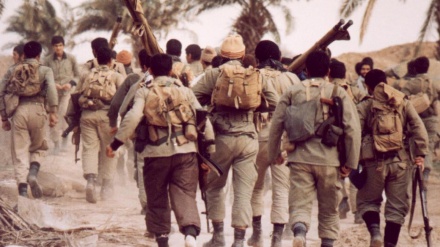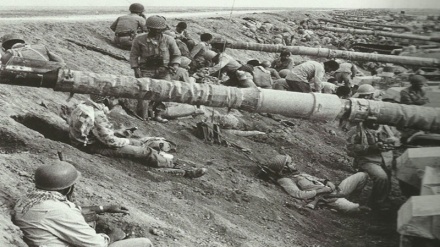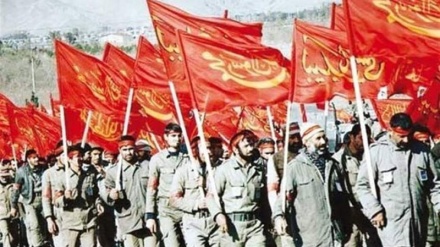Glimpses of Epic of the 8-Year Holy Defense (81)
As a reminder, it was said that the United States, in line with its unflinching support for the Iraqi Dictator, Saddam, in the imposed war against Iran, shot down a passenger aircraft of the Islamic Republic over the Persian Gulf and killed all the 290 passengers.
What shocked the civilized world further was the dastardly measure by president Reagan to award the honorary medal to the criminal commander of the American warship who had targeted the Iranian airplane. In the field arena, too, the Ba’athist army started extensive operations in all fronts with the full support of the US.
The retaking of all regions in the South in three months improved the political and military situation of Saddam remarkably. The Iraqi commanders evaluated that time was in their favour, hence, Iraq put on the agenda to aggravate pressures against Iran. Meanwhile, the conditions were not favorable for Iran like in the past. This was due to the fact that, Iran had lost the regions that it has captured in the Iraqi soil so that it lacked the toll of pressure in the United Nations. Thus, Iran couldn’t continue the war under the Iraqi all-out pressures. These circumstances urged the Supreme Council of War Logistics of the Islamic Republic of Iran, to release a statement wherein the conditions of the war had been explained and the new decisions had been declared for reining in economic woes and recruitment of forces. The Council stressed in its important statement on July 2, 1988, “It is a very sensitive phase for the Revolution and a very great tribulation for our great heroic nation; and the nation should employ all its natural, spiritual and material ability and force and refrain from any simplemindedness.”
The guidance of Imam Khomeini to ask people to fill the battlefronts was assessed by some military pundits that the United Nations might be forced to accept reality and recognize the aggressor and initiator of the war, Saddam; or to make another decision.
The trend of the Iraqi army’s attacks to retake some of the regions that had been taken by Iran required Iran to adopt a proper strategy. Moreover, Iraq, relying on its military superiority and the likelihood of accepting the UNSC Resolution 598 by Iran, intended to continue operations inside the Iranian soil to get the upper hand in the possible peace negotiations. The Iraqi deputy foreign minister Nazar Hamdoon had said, for instance, “We will make every effort to enforce all military, political and economic pressures on Iran till accepting the comprehensive peace by Iran.”
Concurrent with the expansion of the Ba’athist army’s attacks to all fronts, the MKO terrorist outfit, as the main counterrevolutionary grouplet rushed to support Saddam. Saddam, during a ceremony to honour the Iraqi pilots, underlining his army’s potentials, said, “Soon you’ll see that the MKO will penetrate into deeper into Iran.”
The continuation of the status quo was to the benefit of Iraq as the Iranian forces were scattered in different regions and Tehran’s rejection of the UNSCR 598 had given Iraq a good pretext to continue its attacks on Iran. In view of this, the Islamic Republic of Iran retreated from the captured areas in Iraq to both take the pretext from Saddam and reorganize its forces against the attacks of the Ba’athist army. Then, as per the decision of Imam Khomeini the UNSCR 598 was accepted by Iran and it was announced to then UN Secretary General Javier Perez de Cuellar on July 18, 1988 by then Iranian President Ayatollah Seyyed Ali Khamenei. Iran’s retreating in the fronts and acceptance of UNSCR 598 tilted the trend of conditions to Iran’s favour both regionally and internationally.
Although the acceptance of UN Security Council Resolution 598 by Iran took place all of sudden, it was the outcome of a long process in the final years of the war. Saddam, during those years, had managed to organize more forces, spend more money, apply more financial sources and garner more supports from the big powers. Naturally, in such circumstances, Iran evaluated ceasefire more useful and accepted UNSCR 598. In those years, Iraq cemented its military might especially in the air and chemical weapons. This caused Iraq to change its warfare from defensive to offensive ion the ground. Therefore, many factors, including Saddam’s threatening of using chemical weapons more broadly caused the Iranian commanders to change their strategy and accept the resolution 598.
RM/SS


